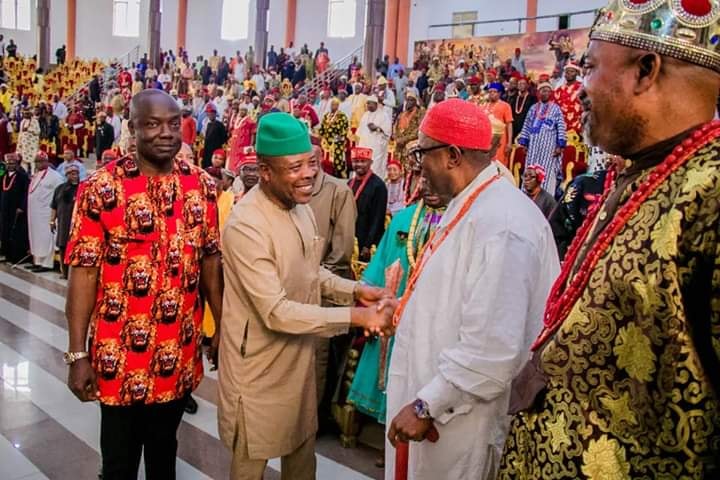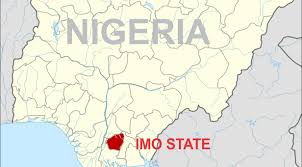Arguably, the recent directive from Gov Emeka Ihedioha to suspend the recognition of the last batch of newly created Autonomous Communities by the previous administration, is one of the best decisions taken by the governor since he assumed office few weeks ago.
Thesaurus defines autonomy as: independence, self-government and self-rule. The irrationality of the disposition is further underscored given that both the old and the newly created communities are still classified as autonomous communities, even when the latter is an offshoot of the former. This again raises the mind blogging question: autonomy from whom?
There is nothing to frown about one demanding to be autonomous, but everything is wrong and suspicious for one to demand for freedom when he was hitherto not under any form of subjugation or oppression? The multiplicity of autonomous communities which has given birth to many Ezes in Imo state, who lack even the basic knowledge of the culture and tradition of ndịgbo, is something every sane state government, like Ihedioha’s must discourage.
The practice of creating autonomous communities was initiated by the former governor of Imo State, Sam Mbakwe, who saw it as a solution to bring lasting peace to warring communities. These communities had a history of age-long bitterness, and the intention of the government was to halt the conflict. It then created new communities out of them, which it termed autonomous. Then, it was needless and appeared useless for a village that shared same ancestry, full right and privileges in their former communities and have the same government, traditional ruler and other traditional heads, to be made an autonomous community. What is “autonomous” in such practice, when they weren’t under any form of oppression?
That singular act by Mbakwe to ensure peace, years later, have birthed myriads of agitations, especially from few individuals who felt they had the wherewithal to superintend the affairs of their traditional chieftaincy institutions. These persons saw creation of an autonomous communities as a veritable avenue to achieve their dreams. It has been a non stop agitation for autonomous community. In fact some traditional rulers are threatened by it. Any little misunderstanding with members of his cabinet, the Eze would be told by a member of his cabinet that can get an autonomous community, if he did not dance to their evil tunes. It was this ridiculous.
Aided by the very well known republican nature of ndị Igbo, even some families wanted the status of an autonomous community. The political pressure was much on subsequent civilian governments who succumbed helplessly and the result was the creation of autonomous communities in their hundreds. Call it a bazzar of autonomous communities and you won’t be found very far from the truth.
Growing up, before I could finish my secondary school education, the community I was living in, Amaraku in Isiala Mbano LGA of Imo state, which was hitherto one autonomous community became three autonomous communities. Orori, Umuorsu, Umukaram, Umuobasi and Umueli were the five villages that made up the community. After some years, Umuorsu and Umukaram became an autonomous community with their own traditional ruler. Not before long, Umueli, the smallest village in the community became an autonomous community with its own traditional ruler. It is possible that it would have been a case of five villages, five autonomous communities in Amaraku, if not for the timely intervention of Rt Hon Emeka Ihedioha.
With an initial number of less than 200 autonomous communities in 1979, Imo today has nearly 700 autonomous communities with demands still mounting. It was reported in some national tabloids that the previous House of Assembly made well over 100 recommendations for autonomous communities. And the plethora of villages and helmets that are in want of the status of autonomous communities are increasing daily.
It has been argued by those canvassing for more autonomous communities that it brings development quicker to the rural areas. It is also reasoned that autonomous community is as financially rewarding as it increases their share from the proceeds of the state government. It is also said that communities that have been split receives more from anything shared by the government than those that have not.
It means that if hitherto Amaraku as a community receives One Million Naira from the state government as one autonomous community, it would now receive Three Million Naira as three autonomous communities. The more a community is split, the more whatever it gets from the government increases. This is what propels the numerous agitation for autonomous community. The agitators of autonomous communities do not consider the economy of the state and the huge financial burden that come to the state government with the duplication of autonomous communities. With the debt profile of Imo state, littered poor infrastructures, pitiable conditions of pensioners and the task of rebuilding the rotten Imo State, the distraction and the cost of running autonomous communities is something a sincere and serious government would put to a halt. One cannot rebuild Imo without being fiscally disciplined and that entails cutting down on unnecessary and avoidable expenses. Suspension of the newly created Autonomous Communities is one of such ways to be financially disciplined.
Before now, autonomous communities do not disturb
the state or local government financially. They mobilize the youths and
wealthy adults and embark in community development projects on their
own. It was such community development project of autonomous community
that culminated to the construction of Imo airport project. Such
practice by the autonomous communities has given away for overt reliance
on the government. The consequence of this is that people no longer to
contribute to projects in their communities, the fear is that the
projects may become another’s, with the creation of an autonomous
community in mind. Suffice it to say, contrary to the general belief
that creation of more autonomous communities ensures development,
creation of new autonomous communities hinders development.
If not,
efforts geared at the development of the communities from which these
demands are emanating, would have been collective.
If a community, with its advantage of size and number, lacks the wherewithal to embark on development projects, the magic of expecting more productivity from such community when it is now fragmented is to one’s imagination. Agitators of new autonomous communities think, albeit falsely, that government has enormous resources to share and the more the communities, the more their fortunes. Ironical?
Beyond the insincere clamour for creation of new autonomous communities by few individuals, is the charlatans that become traditional rulers thereof. These persons, notably the young men among them, have little or no knowledge of the Igbo tradition, customs and values. Some of them are mortally bankrupt. Not many of them can properly perform the tradition of kolanuts in an occasion. But for been a or the major financier of the moves made to get an autonomous community, he is crowned a king, thus desecrating the throne. Some of them were trained in the western part of the country and some outside the country, they have not the littlest of wisdom associated with traditional rulers of Igbo man. They erode, bastardise, denigrate and decimate and whittle down the influence of the Ezeship institution in Igbo land.
With nearly 700 traditional rulers in the state through balkanization of thrones, most of whom live in the cities and some are seen either checking in or out of hotels in Owerri. It behoves on Gov Ihedioha to put a halt to this madness and graciously he did that. Some heads have gone down six feet below in a tussle of who occupies the throne of a new autonomous community. It is un-Igbo for one to campaign and fight to be the Eze of a community. Anaghị azọ Eze azọ is a wise Igbo saying. Some who assumed Eze of a new autonomous community died few days later. Further desecration of the our most cherished culture and tradition must be avoided. It is the duty of the government to restore sanity and order to the traditional institution and the suspension of the new autonomous communities created this is a step every Imolite should welcome with open arms.
However, what is what doing is worth doing very well. Gov Ihedioha should be encouraged to set up a committee that will carry out a research as it concerns formation of autonomous communities since 2007. Yes, this trend started with Ikedi Ohakim, made worse by Okorocha. Imo as a state should not, in my opinion, have more than 400 autonomous communities. It is financially sapping and traditionally offensive. I am very aware that there are certain criteria a village will meet before it is made an autonomous community. Having a market and a school are part of it. More than half of the autonomous communities created by the administration of Chief Ikedi Ohakim and Okorocha Rochas didn’t meet the criteria and they should be merged with another autonomous community that met the requirements.
Quoting Emeka Omeihe, a journalist of repute, “The government must come up with very stringent measures to discourage the fledgling market of autonomous community agitators. Imo people should be encouraged to channel their energies to more productive endeavours rather than rancour and schism. We cannot afford to destroy the society by consenting to the selfish hankering of the burgeoning tribe of agitators.”
God Bless Gov Ihedioha.
It has been argued by those canvassing for more autonomous communities that it brings development quicker to the rural areas. It is also reasoned that autonomous community is as financially rewarding as it increases their share from the proceeds of the state government. It is also said that communities that have been split receives more from anything shared by the government than those that have not.









